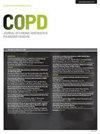Causal Involvement of Immune Cells in Chronic Obstructive Pulmonary Disease: A Mendelian Randomization Study
IF 3.1
3区 医学
Q1 Medicine
International Journal of Chronic Obstructive Pulmonary Disease
Pub Date : 2024-07-09
DOI:10.2147/copd.s460342
引用次数: 0
Abstract
Background: The immune cells play a substantial role in the development and progression of chronic obstructive pulmonary disease (COPD). We aim to investigate the causal involvement of immune cells in COPD via a Mendelian randomization (MR) analysis.Methods: Published genome-wide association studies (GWAS) statistics on immune cells were analyzed, with genetic variants identified as instrumental variables (IVs). Inverse-variance weighting (IVW), weighted median, and MR-Egger regression methods were employed, along with simple mode and weighted mode adopted in the two-sample MR analysis. Sensitivity analysis was conducted to examine the heterogeneity, horizontal pleiotropy, and stability of the causal relationship.
Results: IVW results suggested that CCR2 on CD62L+ plasmacytoid dendritic cells (DC), CCR2 on plasmacytoid DC, CD11b on CD66b++ myeloid cells, CD19 on CD20− CD38− CD24+ memory B cell subset, CD25 on transitional B cells, and CD25++CD8br %CD8br T cells were risk factors for the development of COPD. Besides, CD127 on effector memory-like cytotoxic T lymphocytes lacking expression of co-stimulatory molecule 28 (CD28-EM CTLs) and HLA DR+ NK ACs expressing human leukocyte antigen DR molecules while being natural killer cells (%NK ACs) were protective factors for COPD.
Conclusion: This study unveiled a causal relationship between immune cell phenotype and COPD. These findings offer new insights for the prevention and treatment of COPD using COPD-associated immune cells.
慢性阻塞性肺病中免疫细胞的因果关系:孟德尔随机化研究
背景:免疫细胞在慢性阻塞性肺病(COPD)的发生和发展中起着重要作用。我们旨在通过孟德尔随机分析(MR)研究免疫细胞在慢性阻塞性肺病中的因果关系:方法:我们分析了已发表的有关免疫细胞的全基因组关联研究(GWAS)统计数据,并将遗传变异确定为工具变量(IV)。采用了逆方差加权法(IVW)、加权中位数法和 MR-Egger 回归法,以及双样本 MR 分析中采用的简单模式和加权模式。对因果关系的异质性、水平多向性和稳定性进行了敏感性分析:IVW结果表明,CD62L+浆细胞树突状细胞(DC)上的CCR2、浆细胞DC上的CCR2、CD66b++髓系细胞上的CD11b、CD20- CD38- CD24+记忆B细胞亚群上的CD19、过渡B细胞上的CD25和CD25++CD8br %CD8br T细胞是慢性阻塞性肺病发病的危险因素。此外,缺乏共刺激分子28表达的效应记忆型细胞毒性T淋巴细胞(CD28-EM CTLs)上的CD127和表达人类白细胞抗原DR分子的HLA DR+ NK ACs,同时也是自然杀伤细胞(%NK ACs),是慢性阻塞性肺病的保护因素:本研究揭示了免疫细胞表型与慢性阻塞性肺病之间的因果关系。这些发现为利用慢性阻塞性肺病相关免疫细胞预防和治疗慢性阻塞性肺病提供了新的思路。
本文章由计算机程序翻译,如有差异,请以英文原文为准。
求助全文
约1分钟内获得全文
求助全文
来源期刊

International Journal of Chronic Obstructive Pulmonary Disease
RESPIRATORY SYSTEM-
CiteScore
5.10
自引率
10.70%
发文量
372
审稿时长
16 weeks
期刊介绍:
An international, peer-reviewed journal of therapeutics and pharmacology focusing on concise rapid reporting of clinical studies and reviews in COPD. Special focus will be given to the pathophysiological processes underlying the disease, intervention programs, patient focused education, and self management protocols. This journal is directed at specialists and healthcare professionals
 求助内容:
求助内容: 应助结果提醒方式:
应助结果提醒方式:


